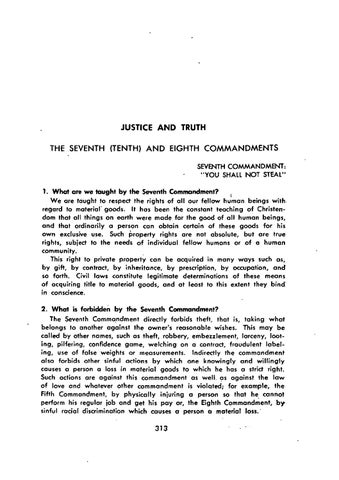JUSTICE AND TRUTH THE SEVENTH (TENTH) AND EIGHTH COMMANDMENTS SEVENTH COMMANDMENT, "YOU SHALL NOT STEAL" 1. What are we taught by the Seventh Commandment? 1 We are tciught to respect the rights of all our fellow human beings with, regard to material" goods. It has been the constant teaching of Christendom that all things on earth were made for the good of all human beings, and that ordinarily a person can obtain certain of these goods for his own exclusive use. Such Property rights are not absolute, but are true rights, subject to the needs of individual fellow humans or of a human community. This right to private property can be acquired in many ways such as, by gift, by contract, by inheritance, by prescription, by occupation, and so forth. Civil laws constitute legitimate determinations of these means of acquiring title to material goods, and at leost to this extent they bind in conscience. 2. What is forbidden by the Seventh Commandment? The Seventh Comma.ndment directly forbids theft, that is, taking what belongs to another against the owner's reasonable wishes. This may be called by other names, such as theft, robbery, embezzlement, larceny, looting, pilfering, confidence game, welching on a contract, fraudulent labeling, use of false weights or measurements. Indirectly the commandment also forbids other sinful actions by which one knowingly and willingly causes a person a loss in material goods to which he has a strict right. Such actions are against this commandment as well. ~s against the law of love and whatever other commandment is violated; for example, the Fifth Commandment, by physically injuring a person so that he. cannot perform his regular job and get his pay ar, the Eighth Commandment, by sinful racial discrimination which causes a person a material loss.¡
313
